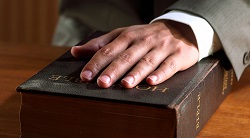A Divine Moment When Heaven and Earth Touch


This week's Torah portion, Vayeitzei, describes the first part of the journey of the biblical Jacob. Fleeing the wrath of his brother, whose birthright he purchased and whose blessing he stole, Jacob is “heading for the exits.”
At his mother’s urging, Jacob is going back to the old country, to the safety his mother presumes he will find in her brother Laban’s home. As the now iconic story unfolds, Jacob stops for the night and has his famous dream of a ladder with angels on it going up and down between heaven and earth. God appears to Jacob in the midst of his dream and makes the covenantal promise to Jacob as He had to Abraham (see Gen. 28:11-15). But, while Abraham spoke directly with God, Jacob can only encounter God in a dream.
Jacob awakens from his dream with a start and declares to no one in particular: Achein yeish Adonai bamakom hazeh v’anochi lo yadati, “Surely God is in this place and I [“I” is repeated] did not know it!” (Gen. 28:16).
Two important themes emerge from Jacob’s observation: The first is Jacob’s focus on his physical location. It’s profound when a young man who leaves his home for the first time to run for his life sees any place along his journey as safe and secure, and identifies it as the dwelling place of God. We can assume that this sense of safety is tremendously comforting to someone described as, “a homespun man keeping to the tents” (Gen 25:27). The place is significant in ways that Jacob is probably not even fully aware. According to our commentators, this was none other than the very same mountain upon which his father Isaac was nearly sacrificed and it would later become the Temple Mount.
Maimonides teaches:
"It is universally accepted that the place on which David and Solomon built the Altar, the threshing floor of Ornan, is the location where Abraham built the Altar on which he prepared Isaac for sacrifice. Noah built [an altar] on that location when he left the ark. It was also [the place] of the Altar on which Cain and Abel brought sacrifices. [Similarly,] Adam, the first man, offered a sacrifice there and was created at that very spot.” (Mishneh Torah, Hilchot Beit Habechirah 2:2)
Professor Jonathan Klawans explains:
“Jacob seems to have found the even hashtiyya (axis mundi), the connection place between Heaven and Earth (Ezekiel 38:12; Mishnah Yoma 5:2; Talmud Bavli, Yoma 54b). The Rabbinic commentary in the Talmudic period as well as later midrashim note specifically that the even hashtiya was in the Holy of Holies and was the center of the world from where the entire Creation was wrought.” (Jonathan Klawans, Purity, Sacrifice, and the Temple [NY/Oxford: Oxford University Press, 2006], pp. 111-144, 124).
The second theme that arises from Jacob’s observation is that he is part of that nexus between heaven and earth. As our Sages teach, this is a pivotal moment because here, the young Jacob realizes, seemingly for the first time, that there is something beyond himself — God is present.
As Lord Rabbi Jonathan Sacks writes:
“When Jacob wakes from his sleep … he says, “Surely the Lord is in this place ve’anokhi lo yadati.” Anokhi means ‘I.’ In this sentence, it is superfluous. To translate it literally we would have to say, ‘And I, I did not know it.’ Why the double ‘I’? To this, Rabbi Pinchas Horowitz (Panim Yafot) gave a magnificent answer. How do we come to know that ‘G-d is in this place’? By ve’anokhi lo yadati — not knowing the I. We know G-d when we forget the self. We sense the ‘Thou’ of the Divine presence when we move beyond the ‘I’ of egocentricity. Only when we stop thinking about ourselves, do we become truly open to the world and the Creator of the world.” (“When the ‘I’ Is Slient,” Covenant and Conversation)
This was Martin Buber’s idea when he articulated his understanding of human and divine relationships in the context of I and Thou (see Buber, I and Thou).
Buber taught that when I experience another person as Thou, and have an I-Thou experience with him (her, them), then he (she, they) is not a thing among things nor does he (she, they) consist of material qualities. He (She, They) is no longer merely a pronoun limited by other pronouns, a dot in the universal grid of time and space. Nor is he (she, they) a characteristic that can be experienced and then described. He (she, they) is not merely a loose bundle of labeled qualities. Standing alone and whole, he (she, they) is Thou, and fills my universe completely. It is not as if there were nothing but he (she, they). Rather it is as if everything else lives in his (her, their) light.
This is true in the same way that a song is not merely a collection of tones nor a verse a mere collection of words nor a painting a collection of lines. One must tear down and break apart in order to make a unified whole revert back to its component parts. So it is with the person whom I call Thou. I can abstract from her the color of her hair or the shadings of her speech or the aura of her graciousness, and in fact, I must often do this. But as soon as I do this, she is no longer Thou, whole and complete; she becomes ‘It’ and is defined by that thing.
Jacob’s understanding of God in this moment is really an understanding of himself as inseparable from the divinity that is all round him and within him.
When I was a teen on the March of the Living, I had an “I-Thou moment,” a moment when God was in that place a I didn’t know it at first.
It was 1990, I was standing with 5,000 other Jewish teens beside the ruins of the crematoria of Birkenau. It had been raining all day as we made our solemn march from Auschwitz to Birkenau. As Elie Wiesel began to speak, the rain suddenly stopped. We stood there contemplating the sky as his remarks were interrupted by a memory that prevented him from continuing. Then the Montreal Girl’s Choir began singing “Eli Eli,” the poem by Hannah Senesh:
“Eli, Eli I pray that these things never end, the sand and the sea, the rush of the waters, the crash of the heavens, the prayer of the heart.” (“The Day Words Failed Elie Wiesel,” song at 02:30)
As they sang the sun came out, the dreary grey day was replaced with bright sunlight. I recall thinking as Jacob felt; “Surely God is in this place and I, I did not know it!”
There are places and moments when and where we feel that we are at the center of the universe, in the meeting point where heaven and earth touch. Jacob had that experience in that moment and his life was forever changed. May we each be so uniquely blessed.
Rabbi Dan Moskovitz is senior rabbi at Temple Sholom in Vancouver, BC. and author of “The Men’s Seder” (MRJ Publishing). Rabbi Moskovitz is also chair of the Reform Rabbis of Canada. His writings and perspectives on Judaism appear in major print and digital media internationally.

Looking at Parashat Vayeitzei, I’d like to focus on an aspect of this intriguing narrative of Jacob’s dream and its immediate aftermath: the vow that Jacob articulates in response to the stunning encounter with the divine Presence.
It is a bit disturbing that the vow Jacob articulates in response to this encounter is totally conditional: “If God is with me and watches over me on this path that I am taking and gives me bread to eat and clothes to wear, and if I return safely to my father’s house, then will the Eternal be my God” (Gen. 28:20-21). It seems like an opportunistic bargain, far removed from our understanding of genuine religious faith: “If God does what I want, fulfilling my needs, then I’ll do something for God in return.” This certainly does not seem like the words of a patriarchal model.
Rabbinic commentators apparently felt the need to address this response. The great 11th-century French commentator Sh’lomoh ben Yitzhak (Rashi) explains that God’s promises are never absolute and unconditional; they always depend on good behavior from the individual being addressed. Even persons who believe that they have had a genuine religious encounter with the divine must not assume, “I have nothing to worry about, God has selected me, and I can therefore do whatever I feel like,” assured that God’s promise will be fulfilled. If the person with the divine encounter proceeds to sin — to forget about God, or assume that he is now automatically protected from misfortune, assured of God’s promise — the sins of that person may indeed cause the abrogation of the divine promise. Therefore, Rashi interprets Jacob’s words not as an expression of skepticism on Jacob’s part — If God fulfills His part of the bargain, then I will accept Him as my God—but rather as an expression of humility on Jacob’s part, a recognition that “something can still go wrong, and the future now is up to me”(Rashi on Gen. 28:21).
Rabbi Moses been Naḥman (Ramban), who flourished in 13th-century Aragon before moving to the Land of Israel, also insists that Jacob is not expressing doubt about God’s promise or articulating a bargain. Rather, he says, Jacob is expressing a view that is indeed disturbing to us but was not totally alien to many Jews. This is that God can be properly worshipped only in the Holy Land. Therefore, Jacob was expressing the idea that he was incapable of making Adonai his God, and establishing the pillar of his dream as God’s dwelling place on earth, until he returns to the Land where God is present (Ramban on Gen. 28:21)
An interpretation somewhat closer to the simple biblical text is that Jacob awakens overwhelmed by what he has experienced, but also, understandably, uncertain, and still a bit scared. He may have thought, “Was it really the God of Abraham, the God of my father Isaac? Was all this really true? Or was it just a dream?” In his response, we see that Jacob is still immature, uncertain of himself, at the beginning of the path of growth toward genuine religious faith. His quest has just begun.
His promise seems to reflect a common human situation, the way so many ordinary people think about God. “I am praying because there is something I really need. O God, if You let me recover fully from this operation… or If You make this business deal go through… or If You let me get chosen for the position that is so important to me…, then I’ll really be a good Jew.”
As W. Gunther Plaut notes, “Jacob’s first encounter with God produces fear and trembling.” He is not yet the man of faith who wrestles with the angel. And indeed, many of his descendants will also “dream of angels and wondrous things, but when they awake and face the realities of the world they too will tremble” (The Torah: A Modern Commentary, rev. ed. [NY: URJ, 2005], p. 209). This statement was probably intended to apply to the suffering of Jews throughout the Middle Ages and in modern times despite their faith in God. The extent to which it continues to apply to the ongoing suffering of believers as well as atheists in so many places in the world today is a constant reminder of the complexities in the promises made by both God and our Patriarch, which continue to undermine the majestic divine promise of Jacob’s dream.
Rabbi Marc Saperstein was ordained at HUC-JIR (NY) in 1972; continuing for a PhD at Harvard, he taught for 29 years at three US universities, before moving to the UK for a five-year term as Principal of Leo Baeck College. His research and publications have been largely devoted to a study of medieval and modern rabbinic sermons as sources for Jewish history.
Vayeitzei, Genesis 28:10−32:3
The Torah: A Modern Commentary, pp. 194–215 Revised Edition, pp. 194–213
The Torah: A Women’s Commentary, pp. 157–182
Haftarah, Hosea 12:13–14:10; The Torah: A Modern Commentary, pp. 344−348; Revised Edition, pp. 214−217

